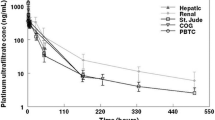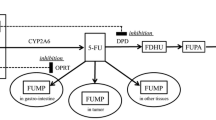Abstract
Purpose
The pharmacokinetics (PKs) of cisplatin have not been investigated in patients with renal dysfunction, characterized by creatinine clearance (Ccr) < 60 mL/min. In this study, we performed a population pharmacokinetic (PPK) analysis of unchanged cisplatin in patients with renal dysfunction. We investigated the effects of renal dysfunction on the PKs and nephrotoxicity of unchanged cisplatin.
Methods
We enrolled 23 patients with moderate renal dysfunction (Ccr calculated to be 30–60 mL/min using the Cockcroft–Gault formula) treated with cisplatin. PPK analysis was performed by nonlinear mixed effect modeling using NONMEM (Version 7.2). We evaluated gender, age, body surface area (BSA), weight, baseline Ccr, baseline serum creatinine (Scr), and baseline urea nitrogen as potential covariates. The final model was evaluated using bootstrap analysis. Renal toxicity was evaluated using Common Terminology Criteria for Adverse Events ver. 4.0. The frequency of severe renal dysfunction (Grade 3/4 Scr elevation) was measured in the population.
Results
A one-compartment model adequately described the unchanged cisplatin data. The population mean values for clearance (CLtot) and volume of distribution (Vd) were 19.1 L/h [coefficient of variation (CV) 19.4%] and 13.8 L (CV 41.0%), respectively. The final model identified BSA as a significant covariate for CLtot. There were no significant covariates for Vd. No patients suffered from severe nephrotoxicity to the point that hemodialysis was required.
Conclusion
Moderate renal dysfunction does not affect the PKs of unchanged cisplatin. The increased serum concentration of cisplatin may not lead to increased toxicity in patients with renal dysfunction.
Trial registration number and date of registration
UMIN000007091 (January 17, 2012).


Similar content being viewed by others
References
Masson E, Zamboni WC (1997) Pharmacokinetic optimisation of cancer chemotherapy. Effect on outcomes. ClinPharmacokinet 32:324–343
Gurney H (2002) How to calculate the dose of chemotherapy. Br J Cancer 86:1297–1302
Jiang J, Liang X, Zhou X et al (2007) A meta-analysis of randomized controlled trials comparing carboplatin-based to cisplatin-based chemotherapy in advanced non-small cell lung cancer. Lung Cancer 57:348–358
Hotta K, Matsuo K, Ueoka H et al (2004) Meta-analysis of randomized clinical trials comparing cisplatin to carboplatin in patients with advanced non-small-cell lung cancer. J Clin Oncol 22:3852–3859
Stahl M, Stuschke M, Lehmann N et al (2005) Chemoradiation with and without surgery in patients with locally advanced squamous cell carcinoma of the esophagus. J Clin Oncol 23:2310–2317
Adelstein DJ, Li Y, Adams GL et al (2003) An intergroup phase III comparison of standard radiation therapy and two schedules of concurrent chemoradiotherapy in patients with unresectable squamous cell head and neck cancer. J Clin Oncol 21:92–98
von der Maase H, Hansen SW, Roberts JT et al (2000) Gemcitabine and cisplatin versus methotrexate, vinblastine, doxorubicin, and cisplatin in advanced or metastatic bladder cancer: results of a large, randomized, multinational, multicenter, phase III study. J Clin Oncol 18:3068–3077
Chu E (2007) Physicians’ cancer chemotherapy drug manual 2017. Jones and Bartlett Publishers, Massachusetts
Hendrayana T, Wilmer A, Kurth V et al (2017) Anticancer dose adjustment for patients with renal and hepatic dysfunction: from scientific evidence to clinical application. Sci Pharm 85:8–23
Ogawa T, Niho S, Nagai S et al (2013) Moderate renal dysfunction may not require a cisplatin dose reduction: a retrospective study of cancer patients with renal impairment. Int J Clin Oncol 18:977–982
Nagai N, Kinoshita M, Ogata H et al (1996) Relationship between pharmacokinetics of unchanged cisplatin and nephrotoxicity after intravenous infusions of cisplatin to cancer patients. Cancer Chemother Pharmacol 39:131–137
Kinoshita M, Yoshimura N, Ogata H et al (1990) High-performance liquid chromatographic analysis of unchanged cis-diamminedichloroplatinum (cisplatin) in plasma and urine with post-columa derivatization. J Chromatogr 529:462–467
Hanada K, Nagai N, Ogata H (1995) Quantitative determination of unchanged cisplatin in rat kidney and liver by high-performance liquid chromatograpy. J Chromatogr B 663:181–186
Nagai N, Ogata H, Wada Y et al (1998) Population pharmacokinetics and pharcodynamics of cisplatin in patients with cancer: analysis with the NONMEM program. J ClinPharmacol 38:1025–1034
Hanada K, Nishijima K, Ogata H et al (2001) Population pharmacokinetic analysis of cisplatin and its metabolites in cancer patients: possible misinterpretation of covariates for pharmacokinetic parameters calculated from the concentrations of unchanged cisplatin, ultrafiltered platinum and total platinum. Jpn J Clin Oncol 31:179–184
Loh JM, Tran AL, Ji L et al (2017) Baseline glomerular filtration rate and cisplatin- induced renal toxicity in urothelial cancer patients. ClinGenitourin Cancer. https://doi.org/10.1016/j.clgc.2017.08.016
Schiller JH, Harrington D, Belani CP et al (2002) Comparison of four chemotherapy regimens for advanced non-small-cell lung cancer. N Engl J Med 346:92–98
Fossella F, Pereira JR, von Pawel J et al (2003) Randomized, multinational, phase III study of docetaxel plus platinum combinations versus vinorelbine plus cisplatin for advanced non-small-cell lung cancer: the TAX 326 study group. J Clin Oncol 21:3016–3024
Kubota K, Watanabe K, Kunitoh H et al (2004) Phase III randomized trial of docetaxel plus cisplatin versus vindesine plus cisplatin in patients with stage IV non-small-cell lung cancer: the Japanese Taxotere Lung Cancer Study Group. J Clin Oncol 22:254–261
Bennis Y, Savry A, Rocca M et al (2014) Cisplatin dose adjustment in patients with renal impairment, which recommendations should we follow? Int J Clin Pharm 36:420–429
Minami H, Ohe Y, Niho S et al (2004) Comparison of pharmacokinetics and pharmacodynamics of docetaxel and cisplatin in elderly and non-elderly patients: why is toxicity increased in elderly patients? J Clin Oncol 22:2901–2908
Reece PA, Stafford I, Davy M et al (1989) Influence of infusion time on unchanged cisplatin disposition in patients with ovarian cancer. Cancer Chemother Pharmacol 24:256–260
Reece PA, Stafford I, Abbott RL et al (1989) Two-versus 24-hour infusion of cisplatin: pharmacokinetic considerations. J Clin Oncol 7:270–275
Acknowledgements
This work was supported in part by the Foundation for Promotion of Cancer Research in Japan. We would like to thank the doctors and nurses of the thoracic oncology and medical oncology departments at the National Cancer Center Hospital East.
Funding
The Foundation for the Promotion of Cancer Research in Japan supported this study (Grant number: FPCR-2012-B).
Author information
Authors and Affiliations
Contributions
TOM: study planning, subject enrollment, conducting research, data analysis. HS: data analysis. HM: study planning. TY: study planning, statistical analysis. KH: study planning, data analysis.
Corresponding author
Ethics declarations
Conflict of interest
The authors declare no competing interests.
Ethical approval
The Ethics Committee of the National Cancer Center approved this study (No. 2011-083).
Consent to participate
Each patient provided written, informed consent to participate.
Consent for publication
Each patient provided written, informed consent to participate.
Availability of data and material
The data of patients enrolled in this analysis will not be used for secondary studies.
Code availability
None.
Additional information
Publisher's Note
Springer Nature remains neutral with regard to jurisdictional claims in published maps and institutional affiliations.
Electronic supplementary material
Below is the link to the electronic supplementary material.
Rights and permissions
About this article
Cite this article
Morita-Ogawa, T., Sugita, H., Minami, H. et al. Population pharmacokinetics and renal toxicity of cisplatin in cancer patients with renal dysfunction. Cancer Chemother Pharmacol 86, 559–566 (2020). https://doi.org/10.1007/s00280-020-04147-4
Received:
Accepted:
Published:
Issue Date:
DOI: https://doi.org/10.1007/s00280-020-04147-4




